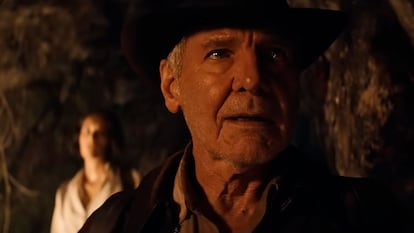Heroes keep getting older and older
Actors are increasingly retiring after they turn 80, with prime examples being Harrison Ford or Patrick Stewart

In many countries, there’s often a debate about raising the retirement age. However, in the world of film, it appears to be rising on its own. A cult of old age has settled in the cinema. From the fleeting fame of brand-new bodies such as James Dean, today, we have come to worship wrinkles. Heroes no longer die at the gates of Troy in the prime of their beauty: they climb walls, dangle from vines and beat up their enemies at an age when they should be enjoying a pension and a seaside residence. Modern heroes have tenure: they can’t be fired. But, if they never retire, what will the future be like for us poor spectators?
The latest and most-commented example of this phenomenon is that of Harrison Ford, who recently bid farewell to the Indiana Jones saga. At 81, the archeologist refused to become a relic. In the film, Ford’s age is an element of the plot. The character he plays receives the call for adventure when he believes that his address — located in a small divorcee’s pad in New York City — has been forgotten. And, before adopting the role of Jones again, Ford took Han Solo for another spin, playing him in the last two Star Wars installments. He’s portrayed two of the myths that we’ve seen grow old.
On the other side of the science-fiction universe — in Star Trek — the years have also ticked along slowly. Captain Jean-Luc Picard has starred in the latest series, which bears his name, and has conquered the hearts of sentimental Trekkies. Sir Patrick Stewart, who has worn the Starfleet uniform since 1987, has just embarked on his last mission… at the age of 82. He leaves behind more than 200 episodes and four movies. Meanwhile, his portrayal of Xavier from the X-Men — his other great action character — ended in 2022, when he was 81. Certainly, this extended career was a strange fate for a British actor who can quote Shakespeare by heart.
Stewart’s case wasn’t unique in the Trekkie universe. His predecessor — the captain of captains, James T. Kirk — continued his adventures through space until he was old enough to carry a pillbox and a blood pressure monitor. William Shatner, the actor who embodied Captain Kirk, is so persistent that he hasn’t been content with just being Kirk. He has tried (unsuccessfully) to detach himself from the character. At the age of 73, he starred in Boston Legal; at 79, he played a grumpy octogenarian in a sitcom. In 2021, at the age of 90, he starred in a self-parody comedy, in which he played a retired astronaut who, after a car accident, needs to live a calmer life. Upon the publication of this article, William Shatner is on tour with a stage show and open for bookings.
Cases like these make Tom Cruise, 61, look like a teenager. Not only due to his fitness routine, but because he’s still of working age. Perhaps in a less hectic or troubled world, they would have transferred him to a calmer service, but just last year, he was determined to return to being Maverick in Top Gun. And, at the moment, he’s playing Ethan Hunt for the umpteenth time in the Mission Impossible saga. If we measure him by Ford’s or Stewart’s standards, he has twenty years left of jumping, shooting, and romancing girls (even if the hero has a fair number of birthdays under his belt, the starlets always seem to be in their twenties).

Added to the extreme examples of active senior citizens is Arnold Schwarzenegger, who not only recounts his life in a recent Netflix documentary series, but has also become a CIA agent in a slapstick comedy show of family entanglements entitled Fubar. Nobody knows whether the self-parody is conscious or involuntary, but it doesn’t matter: the point is that the 76-year-old man who played The Terminator still knocks down 25-year-olds without breaking a sweat. And, in another case of record-breaking, Sylvester Stallone played John Rambo for the last time in 2019, at the age of 73. Alas, he still couldn’t find his friend’s legs.
This longevity of action heroes can be interpreted in a purely commercial sense, as a very profitable way of exploiting myths that everyone is familiar with. Undoubtedly, this is nothing more than the operation of the elementary laws of the market. But every cultural phenomenon influences society: this generational shift in cinema is occurring at a time when reflections on old age abound, both in think tanks and culture. Perhaps, in another age, a gray-haired Indiana Jones with wrinkles wouldn’t have been so popular. Nowadays though, in middle and high-income countries — with people having fewer kids and population pyramids being inverted — phenomena such as the “silver economy” are emerging. Products and services are aimed at the elderly with high purchasing power, while nursing homes are presented as booming investments. Many societies are beginning to become centered around old people.
Take, for example, The Kominsky Method — Chuck Lorre’s bitter comedy about two friends in old age, dealing with physical decline, widowhood and prostate problems. The elderly are protagonists and their condition is the subject of storylines. However, it’s important to specify here that this show (and this phenomenon) is more about the masculine old age, typical of adventure and science-fiction plots. This doesn’t mean that female old age is lacking in representatives and stories… but the absence of testosterone places them in different genres. There’s no female equivalent to Indiana Jones, but there are figures as persistent as Jane Fonda, who released her last film in 2022, at the age of 85, or the case of Jean Smart, who stars in Hacks at the age of 72, a comedy about the old world of stand-up. This show has an air of Sunset Boulevard (1950), in which Gloria Swanson, at the age of 51, plays Norma Desmond, a former silent film star. By today’s standards, Swanson could easily star in a high school series… and not necessarily as a teacher.
Sign up for our weekly newsletter to get more English-language news coverage from EL PAÍS USA Edition
Tu suscripción se está usando en otro dispositivo
¿Quieres añadir otro usuario a tu suscripción?
Si continúas leyendo en este dispositivo, no se podrá leer en el otro.
FlechaTu suscripción se está usando en otro dispositivo y solo puedes acceder a EL PAÍS desde un dispositivo a la vez.
Si quieres compartir tu cuenta, cambia tu suscripción a la modalidad Premium, así podrás añadir otro usuario. Cada uno accederá con su propia cuenta de email, lo que os permitirá personalizar vuestra experiencia en EL PAÍS.
¿Tienes una suscripción de empresa? Accede aquí para contratar más cuentas.
En el caso de no saber quién está usando tu cuenta, te recomendamos cambiar tu contraseña aquí.
Si decides continuar compartiendo tu cuenta, este mensaje se mostrará en tu dispositivo y en el de la otra persona que está usando tu cuenta de forma indefinida, afectando a tu experiencia de lectura. Puedes consultar aquí los términos y condiciones de la suscripción digital.









































